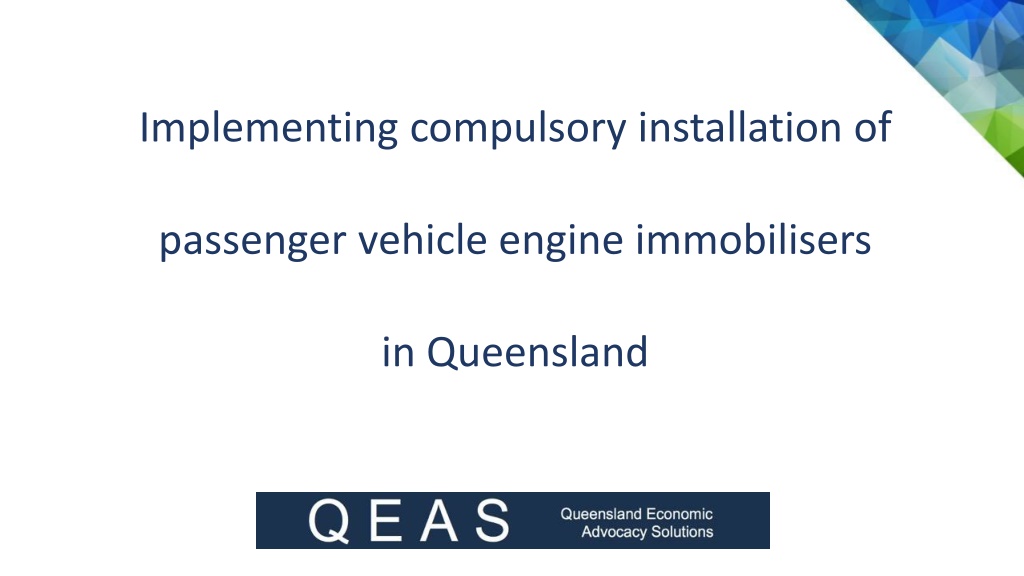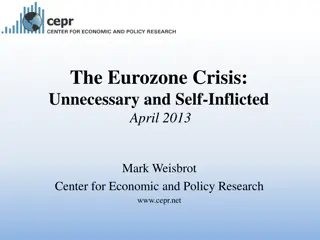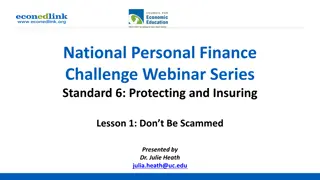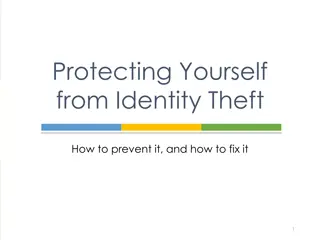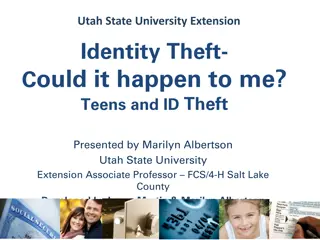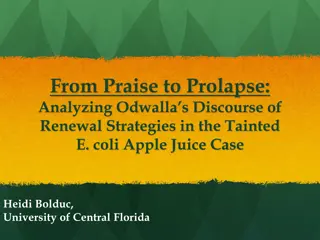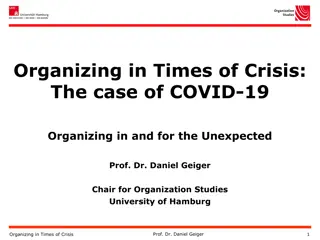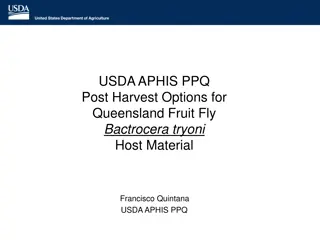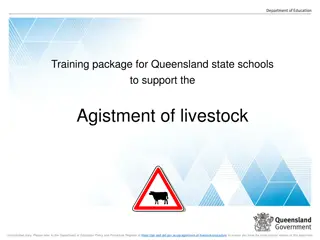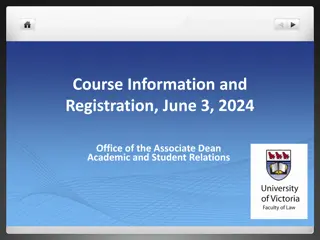Addressing Vehicle Theft Crisis: Compulsory Engine Immobilisers in Queensland
Australia faces a significant vehicle theft issue, with Queensland being particularly affected. The societal and individual impacts are vast, highlighting the urgent need for implementing compulsory installation of engine immobilisers in passenger vehicles to combat theft, reduce crime rates, and protect individuals from financial and emotional losses.
Download Presentation

Please find below an Image/Link to download the presentation.
The content on the website is provided AS IS for your information and personal use only. It may not be sold, licensed, or shared on other websites without obtaining consent from the author. Download presentation by click this link. If you encounter any issues during the download, it is possible that the publisher has removed the file from their server.
E N D
Presentation Transcript
Implementing compulsory installation of passenger vehicle engine immobilisers in Queensland
Introduction Australia recorded a total of 56,312 thefts during the 2019-20 financial year. A very high proportion of youths in juvenile detention are as a result of motor vehicle offences. Putting that into perspective: A car is stolen every 9.5 minutes. One out of every 120 Australian households had a vehicle stolen in the last 12 months. The value of motor vehicles stolen in 2019-20 was $600 million however the cost to society is much more.
Queensland Vehicle Thefts Why vehicle theft so important (for society) ? 16,000? ? ? 14,424? ? ? 14,000? ? Car theft if not just a property crime: ? 13,267? ? ? 11,630? ? ? 12,000? ? 75% of vehicles stolen in Australia are taken by thieves who steal for transport, to commit another crime including armed robberies, break and enters, terrorism or to trade for drugs. ? 10,839? ? ? 10,000? ? ? 8,930? ? ? 8,000? ? Vehicle theft with force, or carjacking, also occurs. This is a serious crime and can be very traumatic for the broader community as well as the victim. ? 6,000? ? ? 4,000? ? ? 2,000? ? Additionally as recently seen in Queensland we have also seen several instances of property crime that have had devastating and tragic impact on the personal lives of innocent Queenslanders. ? -? ? ? ? 2015-16? ? 2016-17? ? 2017-18? ? 2018-19? ? 2019-20? ?
Vehicle pursuits are one of the highest risk aspects of policing. In general, drivers fleeing from police are highly impulsive risk- takers who inadvertently weaponise stolen vehicles, and by that I mean that vehicles are primarily designed to transport people and goods. However, when vehicles are stolen, just the mere act of driving those vehicles at extremely high speeds and outside of the road rules makes that vehicle weaponised. Queensland Police Service April 2021
Why vehicle theft so important (for the individual) Car theft is costly, stressful and inconvenient. On average, victims of vehicle theft incur $5,000 in out of pocket expenses. Victims report mechanical and body damage as well as the loss of work tools, sporting equipment, stereos, personal navigation devices which often result in costs far beyond insurance coverage. Even if insured, there are hidden costs such as insurance excesses, on-going loan repayments, car hire and alternative transport costs. Having a car stolen can also be an emotional experience for victims including loss of personal items that can t be replaced and with some feeling a sense of ownership that their car has been used in another crime. Some victims feel violated, and remain concerned about becoming a victim of theft again. A car is also essential to daily life - shopping, getting to and from uni, taking the kids to school, social activities and work. 1 in 5 cars are never recovered. Individuals report loss of income and employment as a result of losing access to a car.
Getting a sense of Queenslands challenge State 2015/16 2019/20 % change Theft rate per 1,000 registrations Thefts % of thefts Thefts % of thefts 2015/16 2019/20 ACT NSW 912 11,970 1.7 22.2 1,132 11,777 2.0 21.0 24.1% -1.6% 3.18 2.23 3.64 2.04 NT 1,017 1.9 643 1.1 -36.8% 6.44 4.01 QLD 8,930 16.6 14,424 25.7 61.5% 2.20 3.26 SA 3,128 5.8 3,487 6.2 11.5% 2.15 2.32 TAS 1,081 2.0 1,139 2.0 5.4% 2.32 2.34 VIC 18,057 33.5 16,763 29.8 -7.2% 3.71 3.17 WA 8,799 16.3 6,846 12.2 -22.2% 3.87 2.95 AUS ? 53,894 100.0 56,211 100.0 4.3% 2.85 2.77
Queensland has 4 of the top 5 LGA s for vehicle theft State LGA Name Number of thefts Theft rate per 1,0000 population 2018-19 2432 2019-20 2703 2018-19 1.98 2019-20 2.16 QLD Brisbane QLD Gold Coast 1498 1684 2.47 2.71 QLD ACT Logan Greater ACT 1022 853 1235 916 3.13 2.03 3.69 2.15 QLD Moreton Bay 955 881 2.08 1.88 QLD Townsville 693 770 3.57 3.95 VIC Hume 756 707 3.37 3.03 QLD Cairns 562 619 3.40 3.71 VIC Casey 641 552 1.88 1.56 VIC ? Moreland 480 532 2.64 2.86
State or Territory LGA 2015/16 2019/20 % change QLD Brisbane 1,802 3,371 87.1% QLD Gold Coast 1,572 2,238 42.4% QLD Logan (City) 964 1,637 69.8% QLD Moreton Bay 612 1,152 88.2% QLD Townsville 738 860 16.5% QLD Cairns 478 678 41.8% QLD Ipswich 407 631 55.0% QLD Sunshine Coast 309 524 69.6% QLD MacKay 181 432 138.7% QLD ? Toowoomba 255 396 55.3% Over the years, there has been an increase in the number of vehicles stolen from non-metropolitan regions. In 2019-20, more than 1 in 3 vehicles (35%) were stolen from a non-metropolitan region compared to 1 in 5 (21%) vehicles in 2000-01.
Based on theft rates per 1,000 population Mount Isa, Townsville and Cairns are the 3 highest hot spot areas in Queensland. LGA Name Number of thefts 2018-19 96 693 562 1022 305 175 1498 61 Theft rate per 1,000 population 2018-19 5.09 3.57 3.40 3.13 2.62 2.16 2.47 1.77 2019-20 104 770 619 1235 375 242 1684 89 2019-20 5.59 3.95 3.71 3.69 3.21 2.97 2.71 2.57 QLD QLD QLD QLD QLD QLD QLD QLD ? Mount Isa Townsville Cairns Logan Mackay Rockhampton Gold Coast Western Downs
Combating Vehicle Theft Solutions Mandating engine mobilisers fitted to all vehicles in Queensland Education and awareness campaign about the importance of keys Adopting new technologies ghost immobilisers - remote engine immobilisers
The effectiveness of engine immobilisers Engine immobilisers prevent the engine from starting and running by immobilising one or all of three main engine circuits: - the starter motor, the ignition, or the fuel pump. The engine will only start if the electronic codes sent between the vehicle and the key match. Features of a AS/NZS 4601:1999 certified system include: automatic immobilisation within 40 seconds of switching off your engine; two independent points of immobilisation; connections enclosed in security housing; all black security wiring; flashing dashboard LED to indicate that the system is armed; and secure owner PIN override. $220 is the recommended retail price including installation, a minimum two years warranty and GST.
Immobilisers have become a compulsory feature on all new cars sold in Australia (from July 2001). Research on the effectiveness of immobilisers in preventing motor vehicle thefts in Australia by comparing theft rates of vehicles with and without immobilisers is compelling. Within a short time of this initiative vehicles with Australian Standard (AS) immobilisers had far lower theft rates (29.1 per 10,000 registrations) than those with no immobiliser (140.1). More recent research indicates a very strong protective effect for vehicles fitted with an AS immobiliser among vehicles stolen in Australia. Within seven years vehicles with an Australian Standard immobiliser had an even lower theft rate (21.8 per 10,000 registration compared to 83.0 for vehicles with no immobiliser). Research concludes that immobilisers have contributed to the significant reduction in vehicle theft since 2000. In summary uniform application of immobilisers reduces the rate of car theft by around 40 per cent.
Compulsory Installation of Engine Immobilisers Engine immobilisers have had the effect of shifting thefts with evidence of displacement in thefts toward older, non-immobilised vehicles. One in 14 (7%) vehicles in Australia s registered fleet do not have an immobiliser. These non- immobilised vehicles comprised almost a sixth (13%) of all short-term thefts in 2019-20. Estimated cost of compulsory installation on engine immobilisers for all remaining QLD vehicles (385,713) without one is $104.1 million. Any compulsory cost (albeit modest) to the public needs to be evidenced as having a net public interest. Currently examining whether there exists a net benefit whereby initial installation costs are more than offset by benefits to the community including reduced damage to property, reduced incidence of lost earnings, lower insurance premiums and reduced incidence of trauma to the general public. On the face of it there appears to be a very strong public interest in installing engine immobilisers given the prominence of older cars among vehicle thefts .
Whilst the introduction of the immobiliser as standard equipment for all new cars in Australia in July 2001, has seen the overall rate of vehicle theft decline - we have to take into account that we have reached a point of diminishing returns. Changes in theft methods namely stealing car keys has meant that most Queensland vehicle thefts are now a vehicle with an Australian-standard equivalent immobiliser. Immobiliser Type Number of thefts in past 12 months % if thefts in past 12 months No of registered vehicles % of register fleet Theft rate per 1,000 registrations QLD 9,230 76 735 30,035 447 4,357 91.9% 0.8% 7.3% 86.2% 1.3% 12.5% 3,507,019 28,942 385,713 16,768,579 157,422 1,352,796 89.4% 0.7% 9.8% 91.7% 0.9% 7.4% 2.63 2.63 1.91 1.79 2.84 3.22 Australian Standard Non-Australian Standard No Immobiliser AUS Australian Standard Non-Australian Standard No Immobiliser ?
Importance of Keys Advances in technology have made it impossible to hot wire a car. However engine immobilisers are 100% ineffective if the thief has access to the car s keys. Keys are the primary means to steal a vehicle with an immobiliser 70% of late model thefts are via keys. There has been a significant increase in the proportion of vehicle thefts taken from residential locations (e.g. driveways, carports & garages). In 2019-20 54% of all thefts occurred at a residential location. Offenders will sneak into homes, taking advantage of unlocked doors and windows. In addition many cars are stolen from petrol stations, corner stores and elsewhere in public where the owner has left the car with the key in the car, often for less than a minute. The low hanging fruit in solutions to vehicle theft is an education and awareness campaign around the importance of keys.
Ghost Immobilisers Ghost immobilisers are designed for situations where the thief has obtained the car keys (thus rendering the built-in immobiliser redundant) by adding another layer of security. The Ghost is an aftermarket immobiliser which enables motorists to encode a unique, changeable, PIN using select vehicle controls such as those on the steering wheel, door panels or centre console. The PIN must then be entered in order to start the car. The operation of this device works such that if the keys to a car were stolen and entry to the vehicle gained, the thief would not be able to start the vehicle unless the correct PIN code was entered.
Adopting New Technology Queensland needs innovative approaches to dealing with crime. With the rapid development of in-car technologies the time is right to start a conversation about how to improve road safety. A key factor for cars of the near future will be the extent to which they are connected , with on-board technology that can receive and transmit information and instructions. As these technologies develop and become more commonplace there s an opportunity to reduce high risk situations when a vehicle is stolen. Future vehicle technologies, particularly as we move towards connected and autonomous cars, will have greater capabilities to be remotely tracked and safely controlled.
Remote Engine Immobilisers Connected services and GPS in the build of new model vehicles present opportunities to address vehicle thefts namely the theoretical capability to remotely immobilise a vehicle. Remote Engine Immobilisers can be used to slow and take control of a stolen car and thereby greatly reduce the possibility of high-speed chases involving police. Specific to policing functions, remote vehicle immobilisation can be advantageous in three broad scenarios: (1) stolen vehicles reported to police; (2), vehicles detected by police being driven in a dangerous manner and (3) where police are conducting a tactical interception of a vehicle as part of a planned enforcement activity. General Motors have been factory fitting their vehicles with proprietary technology as far back as 1996 which allows for remote connectivity, including start and stop. Other brands are set to offer this service in Australia this year, 2021. The majority of higher end or more expensive vehicles in Australia are also equipped with factory installed GPS tracking systems.
Three points to equally consider: It is far better to stop the vehicle being stolen in the first place than it is attempting to stop the vehicle once it has been stolen. The circumstances which police could direct activation of a vehicle to depower and/or stop are important. If a vehicle cannot be immobilised while stationary, ensuring a vehicle can be stopped in a safe location and in safe circumstances, including the consideration of the safety of those who may alight from a vehicle and the surrounding community once the vehicle is immobilised, are extremely important. The Queensland Legislative Assembly is currently considering this issue. Remote engine immobiliser technology is available right now and if mandated it in all new cars sold, as we have previously done (eg ABS brakes and airbags), then in the not too distant future, most cars on the road would possess this technology.
Queensland Police Union taking the lead In response to Queensland's rising motor vehicle thefts QPU are currently championing the issue of car immobilisers The logic of preventing a motor vehicle theft by simply denying the ability to operate and move the vehicle is irrefutable. In discussions with QPU President, Ian Leavers, we are currently investigating the feasibility of a pilot to be held in Townsville for the installation of 20,000 engine immobilisers to older vehicles. This work includes preparing a preliminary cost benefit analysis for Queensland Government s consideration and implementation. In analysing the public benefit of this important issue - engine immobilisers will provide a significantly safer future for police and members of the public.
Nick Behrens Director Queensland Economic Advocacy Solutions PO Box 847, Bulimba QLD 4171 Mobile 0448 034 355 nickbehrens@qeas.com.au www.qeas.com.au ABN 57028574915
